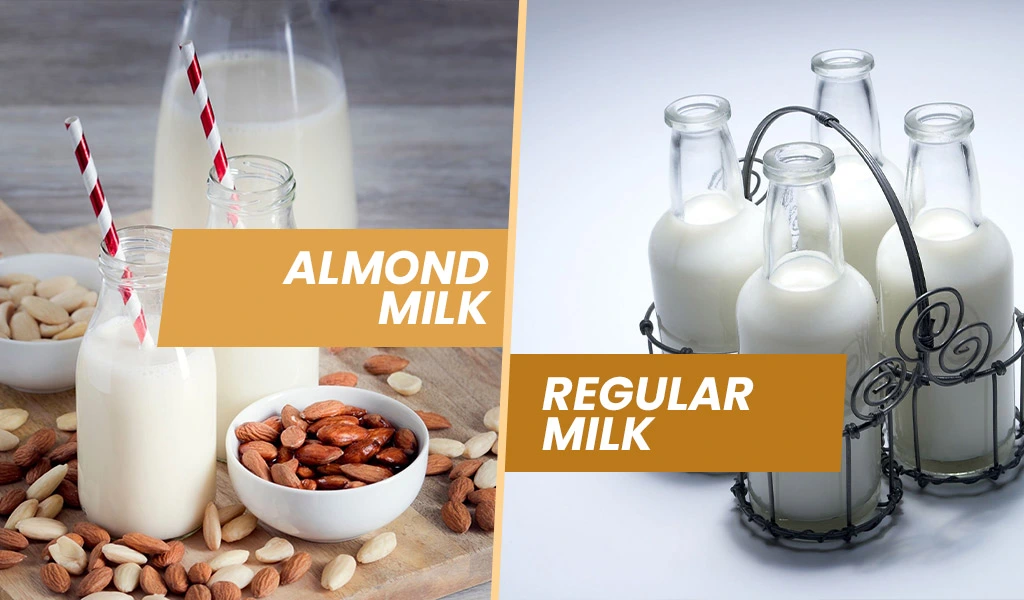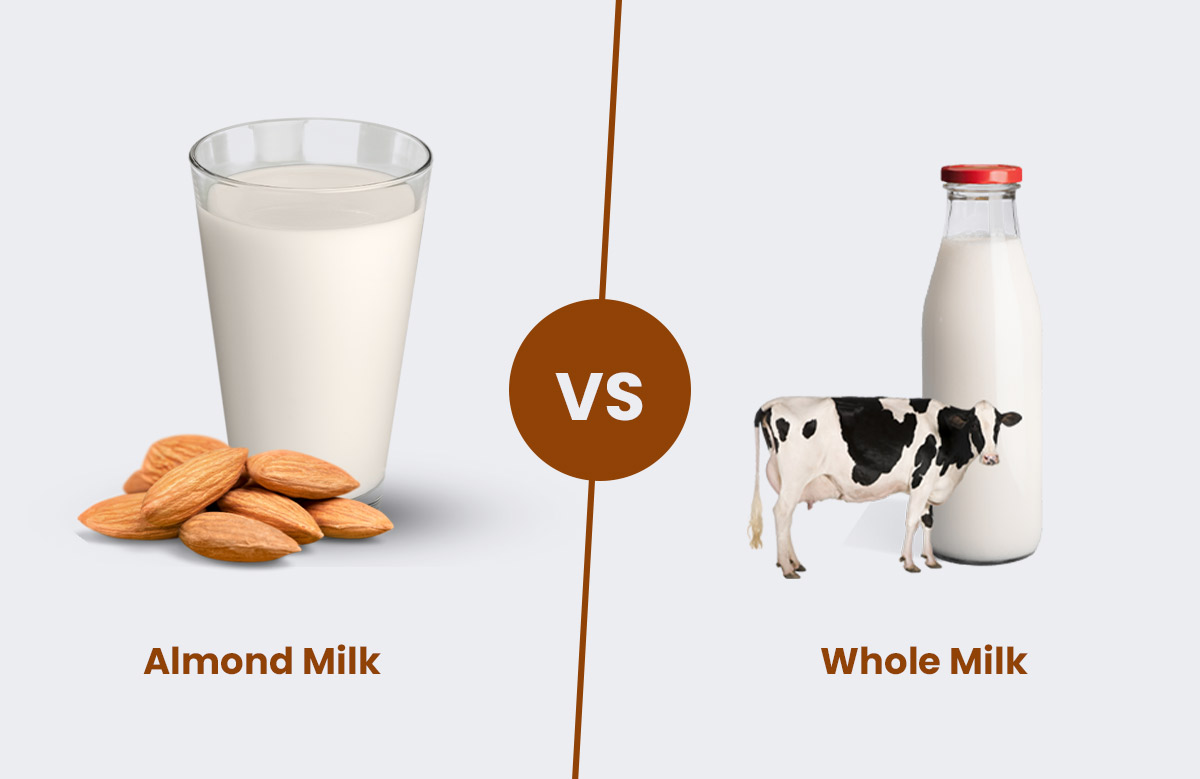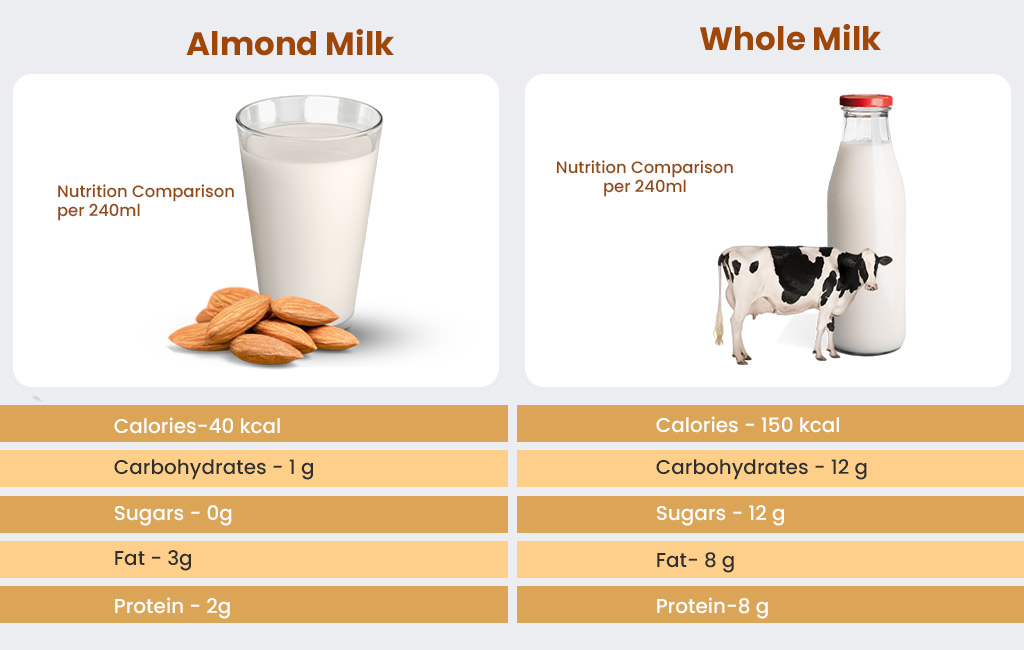Food
Almond Milk Demand is Rising But is it Healthier than Regular Milk?

Almond Milk vs Regular Milk – Milk, whether it is vegan or dairy, should be a regular part of your diet since it is full of important nutrients.
When taking into account a person’s diet, nutritional requirements, and taste preferences, among other things, each type of milk has advantages and drawbacks.
Additionally, there are several alternatives available now, including whole milk, skim (fat-free), and even lactose-free milk.
You can select milk based on your dietary preferences or allergy concerns. However, with the rise of plant-based diets and lactose intolerance, almond milk has emerged as a popular alternative to regular milk.
However, the question of whether almond milk is better than regular milk remains a subject of debate.
This article will provide a comprehensive comparison of regular milk and almond milk to help you make an informed decision on which milk is the best for you.
What Is Whole Milk?
Cow’s milk that has not been nutritionally modified in any way is called whole milk. The milk is taken from the cow nutritionally intact and is subject to food-safe processing.
Whole milk is completely safe if consumed within the shelf life specified by the milk producer, as it is not considered raw milk due to food safety procedures such as pasteurization.
The amount of fat and other nutritional indicators are not changed in whole milk, so nothing is removed, and the milk is not enriched with additional nutrients.
Although on a steady decline for the past decades, cow milk consumption has seen evident growth in 2022.
It is a common practice among milk producers to fortify milk by adding vitamins and minerals. Whole milk is sometimes referred to as fresh or regular milk in food retailing.
Whole milk usually contains a higher fat content and all the components of cow’s milk in terms of taste and nutritional value.
Because cow’s milk is an excellent source of calcium, protein, and other vitamins and minerals, it is the recommended type of milk.
It also probably has the richest and creamiest taste compared to other types of milk.
What Is Almond Milk?
Almond milk is lactose-free, vegan, low in calories, and saturated fat-free. Almonds and water are blended together; then, the remaining solids are strained out to create this sort of milk.
According to its nutrient profile, 1 cup (224 g) of unsweetened almond milk has 40 calories, 2.3 grams of fat, 0 grams of sugar, and just 1 gram of protein. Although it is typically fortified, it does not naturally contain calcium.
In addition, it has beneficial monounsaturated fats (MUFAs), fiber, and vitamin E. Speaking about its flaws, a lot of companies have flavor and sweetened milk.
It has a low protein content and could include carrageenan, which can cause digestive problems. Additionally, it costs more than cow’s milk.
Almond Milk Vs Whole Milk | Comparing Various Factors
Weight Loss
Almond milk has fewer calories than cow’s milk which makes it a great weight-loss option for
individuals who are lactose intolerant or vegan, worried about losing weight or cutting calories. Almond milk is a rich source of naturally occurring carbohydrates, good fats, and protein, because it is mostly composed of water.
Alternatively, as long as cow’s milk calorie intake is controlled and their consumption contributes to a calorie deficit, whole milk can help achieve a weight reduction goal.
Cow’s milk, especially the higher-fat varieties, may be a more effective strategy to increase calorie consumption for people seeking to gain weight.
Allergies And Intolerances
Regular milk can cause allergies in some individuals due to lactose intolerance or cow’s milk protein allergy.
Lactose intolerance occurs when the body is unable to digest lactose, a sugar found in milk, which results in symptoms such as bloating, gas, and diarrhea.
On the other hand, cow’s milk protein allergy occurs when the body reacts to one or more proteins found in cow’s milk.
This type of allergy can cause symptoms such as skin rashes, vomiting, and breathing difficulties.
To overcome this issue, many people opt for nut-based milk or plant-based milk as an alternative.
However, it is important to note that some individuals may also be intolerant to tree nuts, and those with an almond allergy may experience symptoms such as itching, swelling, and difficulty breathing after consuming almond milk.
Also, there is a common misconception that almond milk could cause constipation. But, as VegansFirst reports, this is not entirely true.
This happens because of the added ingredients in store-bought almond milk, such as carrageenan, which can lead to bloating and digestive discomfort.
Both regular milk and almond milk can cause allergies and intolerances in some individuals; it’s important to make choices depending on your needs and health.
Vitamins And Minerals
Numerous vitamins and minerals may be found in abundance in cow’s milk. Vitamins A, B12, B6, riboflavin, niacin, thiamine, pantothenic acid, vitamin D, calcium, magnesium, phosphorus, potassium, zinc, and selenium are all present in significant amounts in a 1-cup serving of 2% milk.
Fat-soluble vitamins A, D, E, and K are less abundant in 1% and 0% milk due to the loss of fat; these vitamins are frequently supplemented.
Almond milk, on the other hand, mostly consists of water and has very little in the way of vitamins and minerals. The majority of almond milk products are fortified with calcium, vitamin D, and vitamin A.
Almond Milk Vs Whole Milk | Nutrition Comparison
Nutrition Comparison per 240ml
| Cow’s milk (whole) | Cow’s milk (skim) | Almond milk (unsweetened) | |
| Calories | 150 kcal | 80 kcal | 40 kcal |
| Carbohydrates | 12 g | 12 g | 1 g |
| Sugars | 12 g | 12 g | 0 g |
| Fat | 8 g | 0 g | 3 g |
| Protein | 8 g | 8 g | 2 g |
| Calcium
%DV |
275mg
33%DV |
300mg
50%DV |
66mg
20%DV |
| Taste | Bland slightly sweet | Bland slightly sweet | Nutty |
Is Almond Milk Healthier Than Regular Milk?
Almond milk is appropriate for vegans and anyone who avoids dairy products because it is entirely plant-based. It is also appropriate for those who are allergic to dairy.
It is not suited as a complete replacement for dairy in young children due to its low protein content. Those with chronic renal disease frequently avoid regular milk due to its high potassium and phosphorus content.
Almond milk, which has significantly fewer of these nutrients, could be a good substitute. Soy milk is naturally low in saturated fat and devoid of cholesterol.
It is also lactose-free. Since soymilk raises estrogen levels, it should be avoided by thyroid sufferers. Ultimately, the choice between almond and regular milk depends on individual dietary needs and personal preferences.
Final Thoughts
Almond milk and regular milk both have advantages and disadvantages. Almond milk is fantastic for people who want to consume fewer calories and follow a vegan diet, but conventional milk is superior for helping young infants develop strong bones.
Almond milk is a water-based, fortified alternative for people who cannot consume dairy products, whereas cow’s milk offers a naturally occurring source of carbohydrates, protein, fats, vitamins, and minerals.
In conclusion, both almond milk and regular milk have their own unique set of benefits and drawbacks.
Eventually, the choice between almond and regular milk entirely depends on an individual’s personal dietary needs and preferences.
Related CTN News:
Custom Cookie Boxes – Attractive and Affordable Cookie Boxes
Best Pickles Recipes with Mustard Oil & Rice Bran Oil
How to Make Regular Holiday Dishes in an Instant Pot































